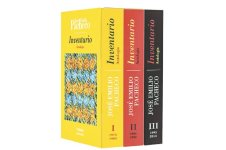Ludus
Reader
Ediciones Era published four years ago (2017) a generous selection of José Emilio Pacheco's Inventario, his extraordinary column, spanning four decades of reviews, essays, opinion pieces, historical notes and literary master classes. The three tomes together sum up to an impressive 2000 pages, and it is just a third of the impossible complete inventarios.
Pacheco (Premio Cervantes, Premio Reina Sofía, excellent poet and short story writer), who signed all of this short and dynamic pieces as JEP, shows his incredible intelligence, erudition and commitment from the start. Just finished reading today the first volume (726 pages). Inventarios about mexican history and poetry, Neruda, García Márquez, Salvador Allende, Oscar Wilde, Pound, the history of the typing machine, new journalism, spanish barroque literature, politics, Henry Milller, Quevedo, Whitman, the modernistas, Kafka, fascism, López Velarde... and that's just a small part of it.

The name of the column, Inventario, is pretty interesting: it could be translated as Inventory, a list of things in a place, but it also suggest the word invention: imagination, creation, intelligence.
I will be reading the second and third volumes in the next months, and I would recommend to anyone who can read Spanish to get a copy of this. You can also get the handy kindle version that includes the whole three volumes in one nifty file.
Pacheco (Premio Cervantes, Premio Reina Sofía, excellent poet and short story writer), who signed all of this short and dynamic pieces as JEP, shows his incredible intelligence, erudition and commitment from the start. Just finished reading today the first volume (726 pages). Inventarios about mexican history and poetry, Neruda, García Márquez, Salvador Allende, Oscar Wilde, Pound, the history of the typing machine, new journalism, spanish barroque literature, politics, Henry Milller, Quevedo, Whitman, the modernistas, Kafka, fascism, López Velarde... and that's just a small part of it.

The name of the column, Inventario, is pretty interesting: it could be translated as Inventory, a list of things in a place, but it also suggest the word invention: imagination, creation, intelligence.
I will be reading the second and third volumes in the next months, and I would recommend to anyone who can read Spanish to get a copy of this. You can also get the handy kindle version that includes the whole three volumes in one nifty file.

